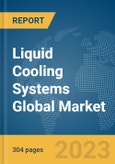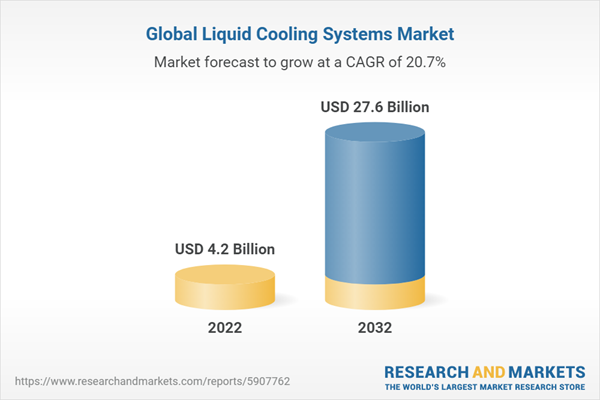The global liquid cooling systems market reached a value of nearly $4.2 billion in 2022, having grown at a compound annual growth rate (CAGR) of 18.9% since 2017. The market is expected to grow from $4.2 billion in 2022 to $10.6 billion in 2027 at a rate of 20.3%. The market is then expected to grow at a CAGR of 21.1% from 2027 and reach $27.6 billion in 2032.
Growth in the historic period resulted from strong economic growth in emerging markets, growth in the manufacturing industry, increased demand for electric vehicles and the rise in demand for high-performance computing (HPC) systems. Factors that negatively affected growth in the historic period were the lack of awareness about liquid cooling technology and the risk of coolant leakage in liquid cooling systems.
Going forward, the emergence of new data centers, the rise in demand among smartphone manufacturers, government initiatives and the rising urbanization will drive the market. Factors that could hinder the growth of the liquid cooling systems market in the future include the high maintenance costs associated with liquid cooling systems.
The liquid cooling systems market is segmented by type into liquid heat exchanger systems and compressor-based systems. The liquid heat exchanger systems market was the largest segment of the liquid cooling systems market segmented by type, accounting for 70.2% of the total in 2022. Going forward, the compressor-based systems segment is expected to be the fastest growing segment in the liquid cooling systems market segmented by type, at a CAGR of 20.6% during 2022-2027.
The liquid cooling systems market is segmented by component into solution and services. The solution market was the largest segment of the liquid cooling systems market segmented by component, accounting for 71.6% of the total in 2022. Going forward, the services segment is expected to be the fastest growing segment in the liquid cooling systems market segmented by component, at a CAGR of 21.1% during 2022-2027.
The liquid cooling systems market is segmented by end-user into BFSI (banking, financial services, and insurance), manufacturing, IT and telecom, automotive, retail, government and defense, healthcare, energy, and other end-users. The IT and telecom market was the largest segment of the liquid cooling systems market segmented by end-user, accounting for 25.4% of the total in 2022. Going forward, the IT and telecom segment is expected to be the fastest growing segment in the liquid cooling systems market segmented by end-user, at a CAGR of 21.3% during 2022-2027.
North America was the largest region in the liquid cooling systems market, accounting for 36.7% of the total in 2022. It was followed by Asia-Pacific, and then the other regions. Going forward, the fastest-growing regions in the liquid cooling systems market will be Asia-Pacific and South America where growth will be at CAGRs of 22.1% and 20.3% respectively. These will be followed by North America and Western Europe where the markets are expected to grow at CAGRs of 19.7% and 19.6% respectively.
The liquid cooling systems market is highly concentrated, with a few large players operating in the market. The top ten competitors in the market made up to 71.13% of the total market in 2021. Schneider Electric SE was the largest competitor with 35.46% share of the market, followed by Vertiv Holdings Co. with 16.88%, Rittal GmbH & Co KG with 10.06%, Emerson Electric Co. with 5.67%, Boyd Corporation with 0.99%, Asetek Inc with 0.96%, CoolIT Systems with 0.65%, Green Revolution Cooling Inc. with 0.19%, Iceotope Technologies Limited with 0.15%, and LiquidCool Solutions, Inc. with 0.12%.
The top opportunities in the liquid cooling systems market segmented by type will arise in the liquid heat exchanger systems segment, which will gain $4.5 billion of global annual sales by 2027. The top opportunities in the liquid cooling systems market segmented by component will arise in the solution segment, which will gain $4.5 billion of global annual sales by 2027. The top opportunities in the liquid cooling systems market segmented by end-user will arise in the IT and telecom segment, which will gain $1.7 billion of global annual sales by 2027. The liquid cooling systems market size will gain the most in the USA at $1.8 billion.
Market-trend-based strategies for the liquid cooling systems market include focus on direct water-cooling technology, the use of 3D technology, focus on self-contained liquid cooling systems, focus on product launches and strategic partnerships and collaborations.
Player-adopted strategies in the liquid cooling systems market include focus on expanding business portfolio by launching new modules, enhancing products portfolio by launching new products, launching new products for the expansion of smart cooling unit solutions, and mergers and acquisitions to improve financial strength, product portfolio and geographical presence.
To take advantage of the opportunities, the recommends the liquid cooling systems companies to focus on direct water-cooling technology, focus on use of 3D technology, focus on self-contained liquid cooling systems, focus on new product launches, expanding in emerging markets, focus on strategic partnerships and collaborations, provide competitively priced offerings, focus on B2B promotions, participate in trade shows and events and focus on fast-growing end-use industries.
Table of Contents
Executive Summary
Liquid Cooling Systems Global Market Opportunities And Strategies To 2032 provides the strategists; marketers and senior management with the critical information they need to assess the global liquid cooling systems market as it emerges from the COVID-19 shut down.Reasons to Purchase
- Gain a truly global perspective with the most comprehensive report available on this market covering 12 geographies.
- Understand how the market is being affected by the coronavirus and how it is likely to emerge and grow as the impact of the virus abates.
- Create regional and country strategies on the basis of local data and analysis.
- Identify growth segments for investment.
- Outperform competitors using forecast data and the drivers and trends shaping the market.
- Understand customers based on the latest market research findings.
- Benchmark performance against key competitors.
- Utilize the relationships between key data sets for superior strategizing.
- Suitable for supporting your internal and external presentations with reliable high-quality data and analysis
Description:
Where is the largest and fastest-growing market for liquid cooling systems? How does the market relate to the overall economy; demography and other similar markets? What forces will shape the market going forward? This report answers all these questions and many more.The report covers market characteristics; size and growth; segmentation; regional and country breakdowns; competitive landscape; market shares; trends and strategies for this market. It traces the market’s history and forecasts market growth by geography. It places the market within the context of the wider liquid cooling systems market; and compares it with other markets.
The report covers the following chapters
- Introduction And Market Characteristics: Brief introduction to the segmentations covered in the market, definitions and explanations about the liquid cooling systems market.
- Key Trends: Highlights the major trends shaping the global liquid cooling systems market. This section also highlights likely future developments in the market.
- Macro Economic Scenario: The report provides an analysis of the Russia-Ukraine war, impact of the COVID-19 pandemic and impact of rising inflation on global and regional markets, providing strategic insights for businesses in the liquid cooling systems market.
- Global Market Size And Growth: Global historic (2017-2022) and forecast (2022-2027, 2032F) market values, and drivers and restraints that support and control the growth of the market in the historic and forecast periods.
- Regional And Country Analysis: Historic (2017-2022) and forecast (2022-2027, 2032F) market values and growth and market share comparison by region and country.
- Market Segmentation: Contains the market values (2017-2022) (2022-2027, 2032F) and analysis for each segment by type, by component, and by end-user in the market.
- Regional Market Size And Growth: Regional market size (2022), historic (2017-2022) and forecast (2022-2027, 2032F) market values, and growth and market share comparison of countries within the region. This report includes information on all the regions Asia-Pacific, Western Europe, Eastern Europe, North America, South America, Middle East and Africa and major countries within each region.
- Competitive Landscape: Details on the competitive landscape of the market, estimated market shares and company profiles of the leading players.
- Key Mergers And Acquisitions: Information on recent mergers and acquisitions in the market covered in the report. This section gives key financial details of mergers and acquisitions, which have shaped the market in recent years.
- Market Opportunities And StrategiesDescribes market opportunities and strategies based on findings of the research, with information on growth opportunities across countries, segments and strategies to be followed in those markets.
- Conclusions And RecommendationsThis section includes recommendations for liquid cooling systems providers in terms of product/service offerings geographic expansion, marketing strategies and target groups..
- Appendix: This section includes details on the NAICS codes covered, abbreviations and currencies codes used in this report.
Scope
Markets Covered:
- 1)By Type: Liquid Heat Exchanger Systems; Compressor-Based Systems
- 2)By Component: Solution; Service
- 3)By End-Users: BFSI (Banking, Financial Services, And Insurance); Manufacturing; IT And Telecom; Automotive; Retail; Government And Defense; Healthcare; Energy; Other End-Users
Companies Mentioned:
Schneider Electric SE; Vertiv Holdings Co.; Rittal GmbH & Co KG; Emerson Electric Co.; Boyd CorporationCountries:
China; Australia; India; Indonesia; Japan; South Korea; USA; Brazil; France; Germany; UK; RussiaRegions:
Asia-Pacific; Western Europe; Eastern Europe; North America; South America; Middle East; AfricaTime-series:
Five years historic and ten years forecast.Data:
Ratios of market size and growth to related markets; GDP proportions; expenditure per capita; indicators comparison.Data segmentations:
country and regional historic and forecast data; market share of competitors; liquid cooling systems market segments.Sourcing and Referencing:
Data and analysis throughout the report is sourced using end notes.Companies Mentioned
- Schneider Electric SE
- Vertiv Holdings Co
- Rittal GmbH & Co KG
- Emerson Electric Co.
- Boyd Corporation
- Asetek Inc
- CoolIT Systems
- Green Revolution Cooling Inc.
- Iceotope Technologies Limited
- LiquidCool Solutions, Inc.
- Fujitsu
- Antec Inc.
- Prime ABGB
- Vedant Computers
- EKWB (EK Water Blocks)
- Thermaltake Technology Co., Ltd.
- FormulaMod
- Bykski
- ID-Cooling (Shenzhen Wanjinghua Technology Co., Ltd.)
- Barrowch
- Colorful (Colorful Technology Company Limited)
- Stulz GmbH
- Iceotope Technologies Limited
- XSPC
- Phobya
- Alphacool International GmbH
- Laird Thermal Systems
- DCX Liquid Cooling Systems
- Kelvion
- Baltimore Aircoil Company
- RSC Group
- Silent-Aire
- AAON Inc
- BasX
- Corsair
- NZXT
- Swiftech
- EVGA
- Vertiv Group Corporation
- Ascenty
- ODATA
- Terabyte
- ChipArt
- ACECO TI
- UOL Diveo S.A.
- Saudi Fan Industries
- Daxtech IT Solutions
- Emitac Data Systems
- Prologix Distribution
- Arabian Thermal Aire Industries Co. Ltd
- Gulf Data Hub
- Liquidstack
- Submer
Table Information
| Report Attribute | Details |
|---|---|
| No. of Pages | 304 |
| Published | November 2023 |
| Forecast Period | 2022 - 2032 |
| Estimated Market Value ( USD | $ 4.2 Billion |
| Forecasted Market Value ( USD | $ 27.6 Billion |
| Compound Annual Growth Rate | 20.7% |
| Regions Covered | Global |
| No. of Companies Mentioned | 53 |









